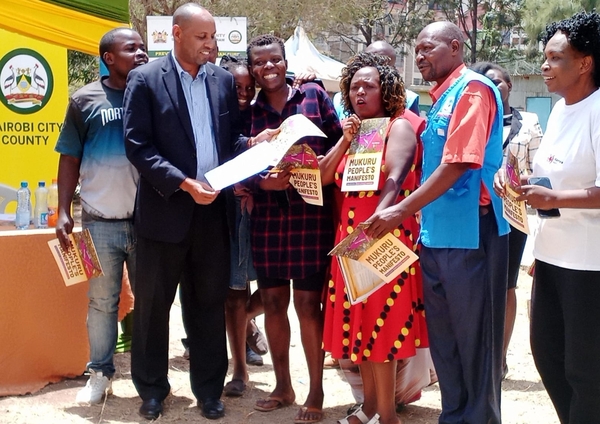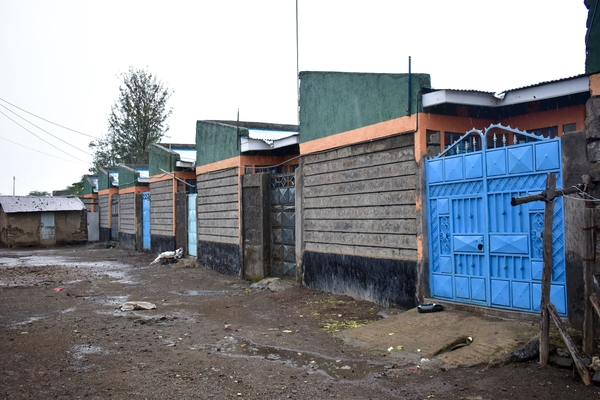- Who We Are
- How We Work
- Regional / Country Initiatives
- Legacy
- Core Themes
- Working Groups
- Portfolio & Results
- Newsroom
- Resources
Kenya: Strengthening Community-Led Action and Climate Adaptation

Project Overview
Kenya's informal settlements are home to millions of urban poor communities who face persistent challenges such as poor living conditions, evictions, and infringement on their tenure rights. Despite policy commitments to address these vulnerabilities, improve living conditions, and ensure tenure security, the experiences of these communities continue to frustrate residents.
This project aims to support the Kenyan Federation, Muungano wa Wanavijiji, in collaboration with Alliance partners SDI-Kenya and Akiba Mashinani Trust, in their efforts to rebuild and strengthen communities. The project seeks to enhance the capacity of the urban poor movement to advocate for inclusion in urban planning and to build resilience to climate change. Specifically, it aims to achieve two key outcomes: increased evidence-based advocacy and amplified community voices, economic livelihoods, and climate action by the urban poor, especially women and youth, and increased capacity of the urban poor to organise and sustain an inclusive and cohesive social movement. The project targets to promote local development in Nairobi, Kisumu, Nakuru, and Mombasa.
This project is part of the Building Resilience in Informal Settlements Programme, a partnership between Cities Alliance and Slum Dwellers International (SDI), funded by the Swedish International Development Cooperation Agency (Sida), to support civil society organisations working in informal settlements.

Project Results: 2022-2024
The project has supported 250 savings groups and 3,785 savers across four cities, providing capacity-building in finance management, governance, community organising, resource mobilisation, and monitoring and evaluation. Additionally, the establishment of a management information systems app (Chama Soft Software) has facilitated the digitisation of record-keeping processes across 20 groups. 683 youth members were mobilised and supported.
Community-led mapping has identified areas in need of climate change interventions, particularly in the preparation of ward adaptation plans. Additionally, the Akiba Mashinani Trust (AMT) has formed a coalition with KDI, The GODown Art Centre, Kenya Space Agency, and UC Berkeley—a river consortium—to analyse and strategise for the Ngong River, a crucial tributary of the Nairobi River. 259 people were supported to better adapt to climate change. Mapping also included 3 city and 83 settlement profiles and 1 settlement enumeration.
The project has established 8 committees to implement the Mukuru People’s Manifesto, with each focusing on key areas: environment, health, education, land, water, sanitation, energy, youth employment, and governance. Two memoranda from the Mukuru Peoples Manifesto Working Committee (MPM) were presented to the Nairobi City County Assembly, addressing governance structures and finances.
Moreover, the project has mobilised community and public participation support for the implementation of the Mathare Special Planning Area (SPA) plan in 4 wards. This effort is further bolstered by increased institutional engagement at the city level. Advocacy efforts further extended to 20 settlement information campaigns, 15 city and national advocacy campaigns and 10 federation leadership meetings being organised. 85 community members also participated in 17 peer learning exchanges.
Mathare-wide SPA campaign advocacy forums and KYC TV documentation have facilitated adaptation planning at the ward level. These 22 initiatives have empowered youth to document and disseminate stories of transformative change achieved at the community level.

Dialogues and Exchanges Leading to Enhanced Climate Action in Kenya
The federation facilitated inter-settlement and inter-country exchanges focused on waste management, ecosystem restoration and land tenure advocacy. These meetings brought together community members, government officials and stakeholders to collaborate on resolving conflicts. Settlement-wide dialogues prioritised key community projects, strengthening advocacy efforts and promoting unity in the face of climate challenges.
Meetings with the Nairobi City Council led to the scaling up of village-level initiatives, a better ability to mobilise and influence policy dialogue and change.
The programme also established community committees addressing water, sanitation and youth employment. The youth-led committees also presented community manifestos, influencing key priorities, such as access to water and education. Moreover, settlement enumerations helped advocate for housing and relief assistance. They documented displaced families and redirected resources to provide immediate support during heavy rains and flooding. Additionally, a solid waste management survey provided key baseline data to develop circular waste management systems. As a result, Kenya also developed a climate action database.
Riparian planning and waste management fostered better stewardship and addressed flooding and environmental degradation. This, combined with the improved social cohesion, financial capacity, higher turn-around of information and advocacy around climate change helped reacting quickly when floods occurred in 2024.
Key Achievements: 2022-2024
- 250 savings groups and 3,785 savers supported
- 683 youth members mobilised and supported
- 259 people supported to better adapt to the effects of climate change
- 3 cities and 83 settlements profiled and 1 settlement enumerated
- 20 settlement level information forums or campaigns
- 15 city or national level advocacy campaigns conducted
- 22 content creating initiatives involving youth
- 10 regional or national level federation leadership meetings were held
- 17 peer-to-peer learning exchanges with 85 individuals
